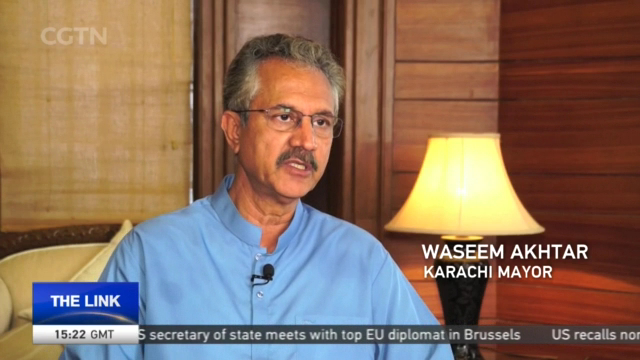
09:32, 16-Feb-2019
The Inspirers: Pakistani environmentalist turns trash into homes
Updated
09:30, 19-Feb-2019
04:30

Just like any developing country, Pakistan is facing growing problems with waste disposal. Karachi has some of the filthiest communities, and many say the situation is getting worse with each passing day. However, no matter where you go, there's always somebody who's willing to make extraordinary personal sacrifices for the good of their community. CGTN's Danial Khan met one such woman who has made it her mission to reduce, re-use and re-cycle industrial waste.
The waste management system of Karachi is in a shambles. The Sindh government has formed a board to oversee the management, but has detached the municipal authority from the whole operation. The concerned local government authority, when approached, declined to comment. And this worries the mayor, who says it is not in his domain, attributing all the mess to the Pakistan People's Party, that runs the provincial government.
WASEEM AKHTAR KARACHI MAYOR "It's a big challenge and a big issue that we are facing as far as the environment is concerned, 60 percent of this garbage goes to rainwater drains, and to different areas on the streets, so the drains are choked because of the garbage, plus the sewerage system is also in a pathetic condition."
Heaps of garbage along the roadside have become a part of life, for the residents of the metropolis.
DANIAL KHAN KARACHI "Karachi, the largest city of Pakistan is home to over 24 million people. The city produces over 12,000 tonnes of garbage every single day and with improper or no solid waste management, the most common way to get rid of it is to either dump it illegally just like this or to burn it."
But then there are people like Nargis Latif, who have found alternative ways to utilize the waste. Twenty-five years ago, she decided to do something about the problem. An environmentalist, Latif's idea was to create homes and furniture out of the city's garbage! She built a team of young boys, mostly scavengers and began her journey.
NARGIS LATIF ENVIRONMENTALIST, GUL BAHAO "Unless you are doing something substantial nobody takes you seriously, unless you link it with their earning, with their stomach! they used to think this was a junk shop, this was their bread and butter and I linked it up with my research, making new products."
It was her childhood dream to be a scientist. Her project called "Gul Bahao", transforms plastic materials rejected by factories into bricks that can be made into low-cost shelters, furniture and pretty much everything. But it was not easy for her in the beginning.
NARGIS LATIF ENVIRONMENTALIST, GUL BAHAO "My family didn't like it, because it was sucking all their money, I was doing nothing for the house, I had three children, one was a little girl, two had grown up, so there was resistance. My father didn't like it one bit. Although I had a good relationship with my father but he didn't like it, he didn't live long, so he couldn't stop me."
Latif says her project is not only aimed at cleaning up the city, but at reducing its output and preventing it from going up in smoke. With no help from the government, she took loans and made shelters in remote areas. In Gharo, a town in the outskirts of Karachi, she built and donated a school, made completely by factory waste plastic. Today, most of her team members have left her in search of better livelihood, but Latif is carrying on with a hope that one day her city will be clean of pollution and plastic bags because someone will be putting them to good use. She says she has done her part and will continue to do so till her last breath, but now it is time that the rest of Karachi joins in as well. Danial Khan, CGTN, Karachi.

SITEMAP
Copyright © 2018 CGTN. Beijing ICP prepared NO.16065310-3
Copyright © 2018 CGTN. Beijing ICP prepared NO.16065310-3